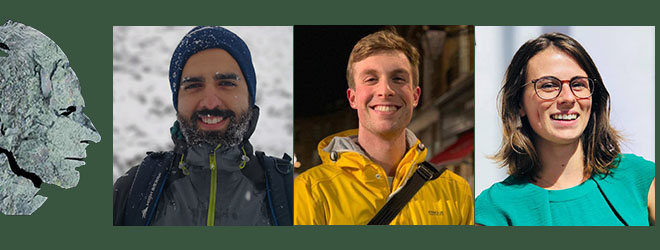As holders of the Arne Næss stipends for 2021, the three students are part of the Arne Næss Programme on Global Justice and the Environment, and will get the opportunity to animate the humanist research on development and the environment at SUM.

Nina Witoszek, head of the Arne Naess Programme, looks forward to work with the three of them.
The three students will work on the philosophical and ethical dilemmas tied to environmental and climate challenges of our time. In particular, they will focus on the relationship between cultural, social and technological innovation for a sustainable future, she says.
Apart from creating the "Arne Næss hub" at the Centre for Development and the Environment, they will contribute to the Arne Næss Symposium - featuring Lord Anthony Giddens - which is planned for the Autumn of 2021 (date to be announced before the Summer).
The students' master projects
All three holders of the Arne Næss stipens for 2021 are students taking part in the master's course ‘Development, Environment and Cultural Change’ at SUM.
Sanne van den Boom is interested in the potential of forms of deliberative democracy, like citizens’ panels, for finding broad-based solutions for environmental problems. In her master's project she will examine how collective interests are defined during a deliberative democratic process and to what extent non-human animals, as well as the broader environment, can be imagined as part of this collective. What drives her research is the conviction that vibrant and widespread democratic engagement is crucial for the transition to a sustainable future.
Alejandro Ruelas' master's project will explore the motivation of rural communities that participate in jaguar conservation programmes in the south of the Yucatán Peninsula, Mexico. It will attempt to reveal their views of the goals, strategies, and consequences of government and NGO-led conservation efforts that take place in their territories, often framed by asymmetrical power dynamics. Further, it will investigate their relationships with the species and the landscape to reveal alternative understandings that lead to fairer, more effective environmental policies.
Hendrik Pröhl's research project will investigate how environmental ethics shape the policy framework developed for transitioning to hydrogen-based energy production in Germany‘s city-state of Bremen. Primarily drawing on ethnographic research methods, it will investigate how government officials determine who and what counts as moral subjects, what follows for human-environment relations in the move to new energy sources, and how state Intervention can serve to contribute to achieve the green transition.
Arne Naess Programme
We draw on the legacy of Norway’s foremost eco-philosopher, Ghandi scholar and environmental activist. Read more about the Programme.
Research on culture, nature and ideology
 Read more about our research group Culture, ethics and sustainability.
Read more about our research group Culture, ethics and sustainability.
